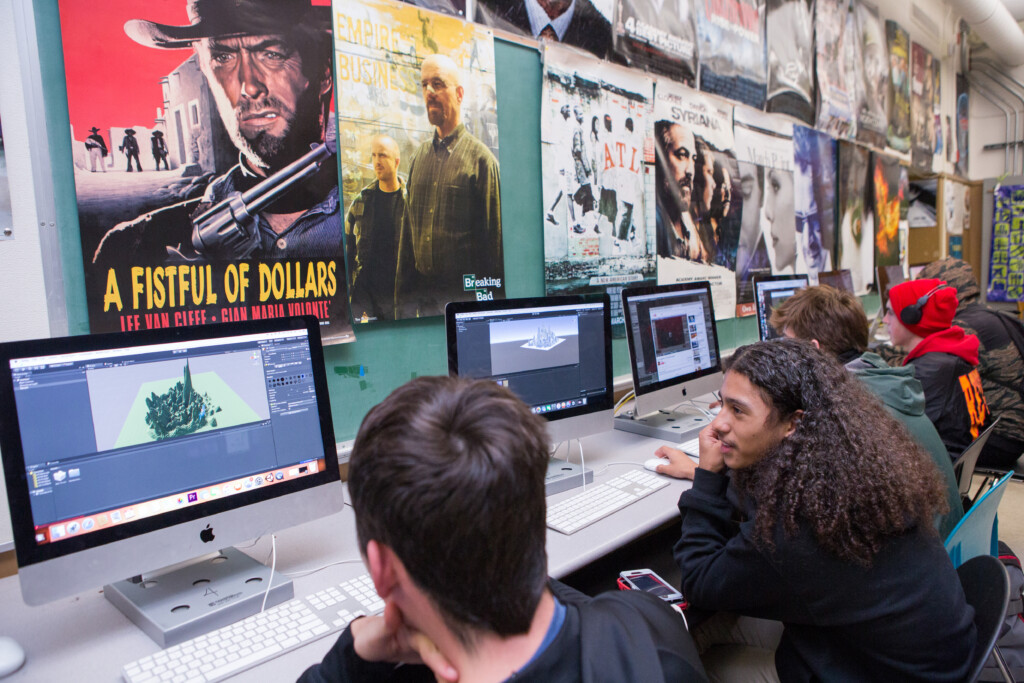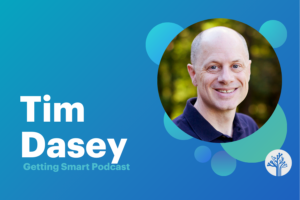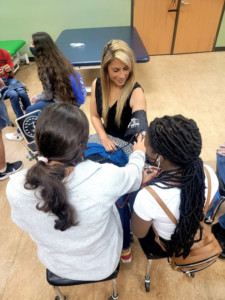Impact Projects at Northeastern University
Key Points
-
Experiential learning at Northeastern University, through programs like the historic co-op and AI for Impact, effectively prepares students for future challenges and opportunities in the workforce.
-
The focus on real-world problem solving and AI application equips students with not only technical skills but also critical thinking and social responsibility, making them ready to tackle complex societal issues.

Engaging students in impact-driven projects is one of the most effective ways to cultivate valuable skills while developing what Charles Fadel refers to as the key Drivers of learning: Motivation, Identity, Agency, and Purpose. These Drivers are increasingly recognized as essential in Education for the Age of AI, where adaptability and a sense of purpose will define success. By offering students real-world, hands-on opportunities, we can better prepare them to navigate the complexities of the future workplace and society.
Northeastern University exemplifies this approach through its extensive, longstanding and iterative, experiential learning programs. Whether through authentic journalism experiences—like those led by Professor Carlene Hempel, where students report directly from the field as a part of a traveling press corps —or through IDEA, the university’s student-led venture accelerator, which has supported over 2,500 entrepreneurs and helped launch more than 100 ventures collectively raising over $644 million in external funding, Northeastern provides a broad spectrum of opportunities. Their historic co-op program and Experiential Network (NX) (more on these below) are prime examples of how the university’s focus on real-world learning enables students from all disciplines to build the skills and experience needed to thrive in their chosen fields.
The History of Northeastern University’s Co-op Program
Northeastern University’s experiential co-op model stands as one of the oldest and most well-established in the country, with a history dating back to 1909. Upwards of 8,000 undergrad and graduate students participate in these programs at any time, with most undergraduates completing two or three co-op placements throughout their time at the university. This amounts to over 90% of Northeastern students participating in the co-op program and integrating academic learning with real-world work experience. The program allows students to alternate between periods of study and full-time employment in their chosen field, providing invaluable hands-on experience. With partnerships spanning over 3,100 employers across the United States and 136 countries globally (including Amazon Robotics, Apple, Tesla, Goldman Sachs, Boston Consulting Group, Pfizer, Microsoft, Fidelity Investments, and international: United Nations, World Health Organizations, Amnesty International, European Parliament, International Criminal Court (The Hague), UNICEF, World Bank, Greenpeace, Human Rights Watch, International Labour Organizations), Northeastern students have access to diverse opportunities that prepare them for the evolving job market.
The co-op model at Northeastern is designed to ensure students are not only well-prepared but also able to reflect and integrate their work experiences into their academic journey. Before starting their first co-op, students complete a mandatory preparation course, equipping them with the skills needed for success in the workplace. Throughout the program, students engage in structured reflections, allowing them to apply what they’ve learned back to their studies. This thoughtful approach has proven effective, as 93% of Northeastern graduates are employed or enrolled in graduate school within nine months of graduation, often earning a 33% higher starting salary compared to the national average. Employers consistently praise Northeastern students for their readiness and performance, solidifying the university’s co-op program as a leader in experiential education.
Professor Chris Unger, author of A Revolution in Education (and former podcast guest) recently highlighted the new AI for Impact Co-op Program as a shining example of experiential, forward-thinking learning.
AI for Impact
Northeastern is committed to leading in an AI future. This is represented by their Institute for Experiential AI, as well as their AI for Impact Co-op, an initiative of the Burnes Center for Social Change at Northeastern University. In partnership with public interest organizations, teams of students sign on to work on significant social issues using AI. Partners have included the Commonwealth of Massachusetts, as part of the “InnovateMA” program announced by Massachusetts Governor Maura Healey to position Massachusetts as a global leader in applied AI.
These are 6-month-long paid co-ops, with a focus on developing human-centered solutions with AI. Throughout the experience, students get to work hands-on with professional technology products and alongside professional mentors. The co-ops include deep-dive skill-building workshops, helping build the AI talent pipeline and create the next generation of AI-enabled leaders. Projects are selected using the following criteria:
- Enhancing Accessibility: Leveraging AI transforms complex information into easily accessible formats, breaking language and literacy barriers.
- Streamlining Critical Services: By implementing AI solutions, we’re simplifying essential public services, making them more user-friendly and efficient.
- Improving Public Service Quality: Projects utilize AI to deliver higher quality public services, ensuring equitable access and enhancing user engagement.
- Transforming Lives through Technology: Each project harnesses the power of AI to make a real difference in people’s everyday lives
The course Syllabus outlines the seven tentative projects the students are working on. A few of the standout projects are:
Executive Office of Administration and Finance – Build for Mass
- Problem: Assisting Massachusetts municipalities, environmental justice groups, rural towns, and historically underserved communities to apply for state grant, grant-matching, and tax-break opportunities
- Solution: Development of an AI-driven tool, designed to simplify the process of locating and applying for state grants and loans. This solution aims to understand user needs through natural language processing, offering intuitive, multilingual support and potentially assisting with form completion.
HHS/MEC – MassHealth Helper
- Problem Identification: Assisting residents to obtain health insurance by providing public professionals efficient access to comprehensive information to speed their responses to the public.
- Potential Solution: An AI-driven knowledge tool for quick access to policy and procedural guidelines, able to deliver accessibly formatted responses.
Link Health – A Healthier Democracy AI
- Problem Identification: Helping low-income Massachusetts residents apply for 80 billion dollars of unclaimed Federal Aid benefits in a healthcare setting. The current process is hindered by a lack of accessible information and application modalities.
- Potential Solution: Leveraging AI to provide centralized access to information and increase the accessibility of the application process.
Massachusetts AI Collaboration for Higher Education (MACH) – The Course Catalog/MA Course Navigator
- Problem Identification: Develop an AI-driven platform that mines and aggregates publicly available program offerings and course catalog information from the Commonwealth’s 24 community colleges and state universities
- Potential Solution: Enable prospective students and their families to easily discover educational pathways, including majors, programs, prerequisites, and transfer opportunities
Experiential Network (NX)
Lastly, we get to Northeastern’s new Experiential Network (NX). NX builds upon the Northeastern “humanics” curriculum (a blend of technology, data, social sciences, and project management skills), engaging students in experiential learning opportunities with real-world partners. it’s not just about demanding change; it’s about turning those demands into practical, impactful solutions.
In this program, students engage with a wide range of prominent partners such as Innovate Public Schools, the Museum of Science, Stacey Abrams’ Fair Count, the Commonwealth of Massachusetts, and the PopVox Foundation. This collaboration with government, nonprofit, and civic organizations goes beyond theoretical discussions, creating innovative solutions that have a genuine impact on communities.
Dr. Allison Ruda, Associate Dean of Use-Inspired Research at Northeastern’s College of Professional Studies (CPS), and Dr. Amanda Welsh, Associate Dean of Workforce & Economic Development, and Director of the Center for the Future of Education and Talent Strategy (CFHETS), are advancing solutions that enhance accessible pathways to professional qualifications and workforce readiness. “Using keyword matching algorithms to identify and match skills across different text artifacts (such as a job description and a course syllabus) enables us to put employers and students in the same zip code,” Ruda explains, “but layering in LLMs will enable us to more fully understand what skills mean in a given context. LLM agent-based interviews with employers, teachers, students, and job seekers give us an incredibly powerful tool for harnessing natural language describing experience. Testing and refining those models is the work that lies ahead.”
Conclusion
These programs are great examples of connecting learners to work that matters, building agency, and are an extension of what we’re seeing across the country in Real World Learning, client-connect projects, AI-powered problem solving and difference-making. Additionally, we’re seeing glimpses of this in K-12 learning environments like in St. Vrain where 200 kids get to do client-connected projects and get paid $13/hour.

Tom Vander Ark






0 Comments
Leave a Comment
Your email address will not be published. All fields are required.